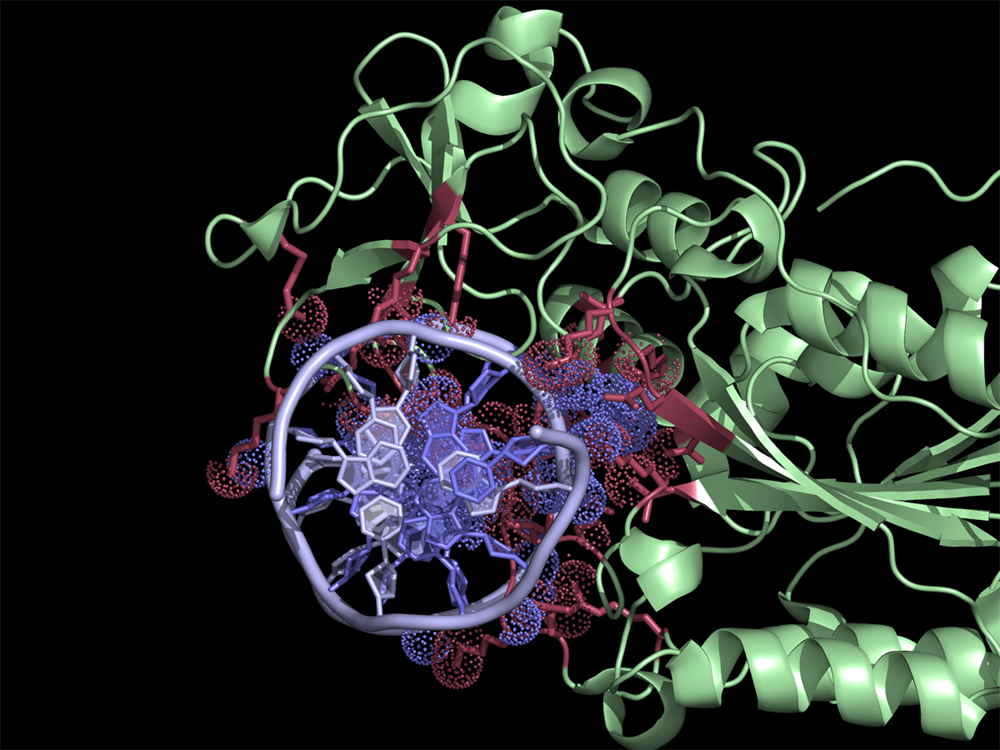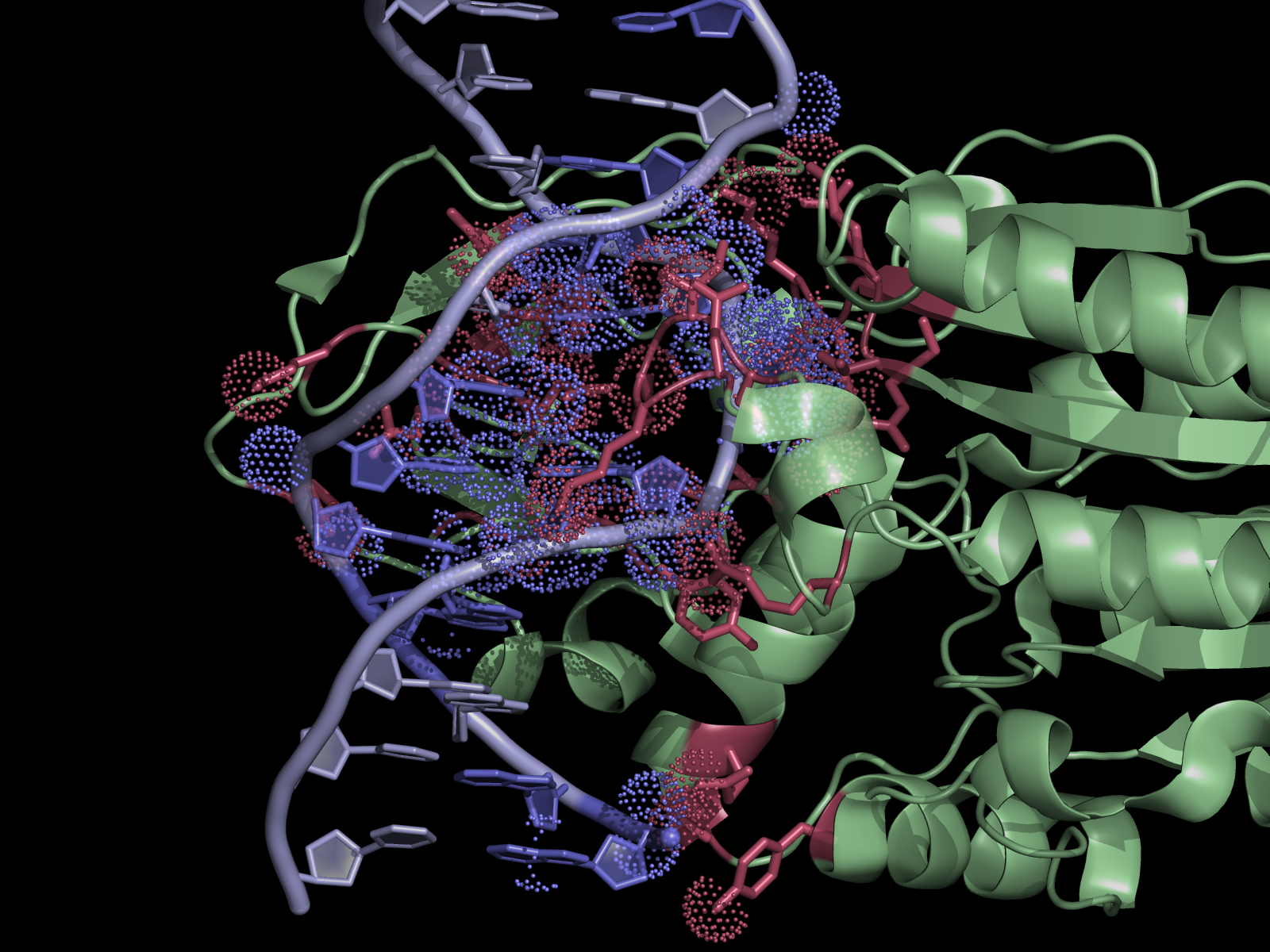Ccp4 ncont: Difference between revisions
m (moved ContactsNCONT to SelectNCONTContacts: unify naming scheme for new scripts) |
(updated script with faster selection and naming scheme.) |
||
| Line 1: | Line 1: | ||
[[File:HhaExample.png|thumb|300px|right|Interface residues (at cutoff <4A) in the 2c7r.pdb were found using NCONT. Usage of | [[File:HhaExample.png|thumb|300px|right|Interface residues (at cutoff <4A) in the 2c7r.pdb were found using NCONT. Usage of selectNCONTContacts script in PyMOL allows easy selection of residues and atoms listed in ncont.log file. Interacting protein and DNA residues are colored in red and slate, respectively. Atoms in contact are shown in dots.]] | ||
== Overview == | == Overview == | ||
The script selects residues and atoms from the list of the contacts found by NCONT from CCP4 Program Suite (NCONT analyses contacts between subsets of atoms in a PDB file). | The script selects residues and atoms from the list of the contacts found by NCONT from CCP4 Program Suite (NCONT analyses contacts between subsets of atoms in a PDB file). | ||
First, we run NCONT on our pdb file to find interface residues. Then by using the | First, we run NCONT on our pdb file to find interface residues. Then by using the selectNCONTContacts script in PyMOL we separately select residues and atoms listed in a ncont.log file. This generates two selections (atoms and residues) for each interacting chain, allowing quick manipulation of (sometimes) extensive lists in NCONT log file. | ||
This script works best for intermolecular contacts (when NCONT target and source selections don't overlap). If crystal contacts (NCONT parameter cell = 1 or 2) are included then additional coding is required to distinguish inter from intramolecular contacts. | This script works best for intermolecular contacts (when NCONT target and source selections don't overlap). If crystal contacts (NCONT parameter cell = 1 or 2) are included then additional coding is required to distinguish inter from intramolecular contacts. | ||
| Line 10: | Line 10: | ||
== Usage == | == Usage == | ||
selectNCONTContacts( contactsfile, selName1 = "source", selName2 = "target" ) | |||
| Line 17: | Line 17: | ||
First use NCONT to find interface residues/atoms in the pdb file. Once you have ncont.log file proceed to PyMOL. | First use NCONT to find interface residues/atoms in the pdb file. Once you have ncont.log file proceed to PyMOL. | ||
Make sure you've run the | Make sure you've run the selectNCONTContacts script first. | ||
fetch 2c7r | fetch 2c7r | ||
selectNCONTContacts ncont.log, selName1=prot, selName2=dna | |||
[[File:HhaI20example.png|thumb|300px|right|Quick and easy selection of interacting residues and atoms listed in the NCONT log file. Protein and DNA residues are colored in red and slate, respectively. Atoms in contact are shown in dots.]] | [[File:HhaI20example.png|thumb|300px|right|Quick and easy selection of interacting residues and atoms listed in the NCONT log file. Protein and DNA residues are colored in red and slate, respectively. Atoms in contact are shown in dots.]] | ||
| Line 27: | Line 27: | ||
<source lang="python"> | <source lang="python"> | ||
import re | import re | ||
def | def parseNCONTContacts( f ): | ||
# /1/B/ 282(PHE). / CE1[ C]: /1/E/ 706(GLN). / O [ O]: 3.32 | # /1/B/ 282(PHE). / CE1[ C]: /1/E/ 706(GLN). / O [ O]: 3.32 | ||
conParser = re.compile("\s*/(\d+)/([A-Z]*)/\s*(\d+).*?/\s*([A-Z0-9]*).*?:") # * in the second group is needed when chain code is blank | |||
conParser = re.compile("\s*/(\d+)/([A-Z]*)/\s*(\d+).*?/\s*([A-Z0-9]*).*?:") # * is needed when chain code is blank | |||
mode = 0 | mode = 0 | ||
s1 = [] | s1 = [] | ||
| Line 54: | Line 53: | ||
else: | else: | ||
print "Unknown mode", mode | print "Unknown mode", mode | ||
def | def selectNCONTContacts( contactsfile, selName1 = "source", selName2 = "target" ): | ||
""" | """ | ||
selectContacts -- parses CCP4 NCONT log file and selects residues and atoms | selectContacts -- parses CCP4/NCONT log file and selects residues and atoms. | ||
http://www.ccp4.ac.uk/html/ncont.html | |||
PARAMS | PARAMS | ||
contactsfile | contactsfile | ||
filename of the CCP4 NCONT contacts log file | filename of the CCP4/NCONT contacts log file | ||
selName1 | selName1 | ||
the name prefix for the _res and _atom selections returned for the | the name prefix for the _res and _atom selections returned for the | ||
source set of chain | source set of chain | ||
selName2 | selName2 | ||
the name prefix for the _res and _atom selections returned for the | the name prefix for the _res and _atom selections returned for the | ||
target set of chain | target set of chain | ||
RETURNS | RETURNS | ||
4 selections of interface residues and atoms are created and named | |||
depending on what you passed into selName1 and selName2 | |||
AUTHOR | REPOSITORY | ||
Gerhard Reitmayr and Dalia Daujotyte, 2009. | https://github.com/GerhardR/pymol-scripts | ||
AUTHOR | |||
Gerhard Reitmayr and Dalia Daujotyte, 2009. | |||
""" | """ | ||
# read and parse contacts file into two lists of contact atoms and contact pair list | # read and parse contacts file into two lists of contact atoms and contact pair list | ||
s1, s2, pairs = | s1, s2, pairs = parseNCONTContacts(open(contactsfile)) | ||
# create a selection for the first contact list | # create a selection for the first contact list | ||
# create the PYMOL selection macros for the residues | |||
resNames = [chain+"/"+residue+"/" for (type, chain, residue, atom) in s1] | |||
cmd.select( | # put them in a set to remove duplicates and then join with 'or' | ||
for ( | resSel = " or ".join(frozenset(resNames)) | ||
# finally select them under the new name | |||
cmd.select(selName1 + "_res", resSel) | |||
atomNames = [chain+"/"+residue+"/"+atom for (type, chain, residue, atom) in s1] | |||
atomSel = " or ".join(frozenset(atomNames)) | |||
cmd.select(selName1 + "_atom", atomSel) | |||
# create a selection for the second contact list | # create a selection for the second contact list | ||
resNames = [chain+"/"+residue+"/" for (type, chain, residue, atom) in s2] | |||
resSel = " or ".join(frozenset(resNames)) | |||
cmd.select( | cmd.select(selName2 + "_res", resSel) | ||
for ( | |||
atomNames = [chain+"/"+residue+"/"+atom for (type, chain, residue, atom) in s2] | |||
atomSel = " or ".join(frozenset(atomNames)) | |||
cmd.select(selName2 + "_atom", atomSel) | |||
cmd.extend(" | |||
cmd.extend("selectNCONTContacts", selectNCONTContacts) | |||
</source> | </source> | ||
== Code repository == | |||
The latest version of this script and related scripts is available at https://github.com/GerhardR/pymol-scripts. | |||
[[Category:Script_Library]] [[Category:ThirdParty Scripts]] [[Category:Structural Biology Scripts]] | [[Category:Script_Library]] [[Category:ThirdParty Scripts]] [[Category:Structural Biology Scripts]] | ||
Revision as of 15:19, 19 June 2011

Overview
The script selects residues and atoms from the list of the contacts found by NCONT from CCP4 Program Suite (NCONT analyses contacts between subsets of atoms in a PDB file). First, we run NCONT on our pdb file to find interface residues. Then by using the selectNCONTContacts script in PyMOL we separately select residues and atoms listed in a ncont.log file. This generates two selections (atoms and residues) for each interacting chain, allowing quick manipulation of (sometimes) extensive lists in NCONT log file.
This script works best for intermolecular contacts (when NCONT target and source selections don't overlap). If crystal contacts (NCONT parameter cell = 1 or 2) are included then additional coding is required to distinguish inter from intramolecular contacts.
Usage
selectNCONTContacts( contactsfile, selName1 = "source", selName2 = "target" )
Examples
First use NCONT to find interface residues/atoms in the pdb file. Once you have ncont.log file proceed to PyMOL. Make sure you've run the selectNCONTContacts script first.
fetch 2c7r selectNCONTContacts ncont.log, selName1=prot, selName2=dna
The Code
import re
def parseNCONTContacts( f ):
# /1/B/ 282(PHE). / CE1[ C]: /1/E/ 706(GLN). / O [ O]: 3.32
conParser = re.compile("\s*/(\d+)/([A-Z]*)/\s*(\d+).*?/\s*([A-Z0-9]*).*?:") # * in the second group is needed when chain code is blank
mode = 0
s1 = []
s2 = []
pairs = []
for line in f:
if mode == 0:
if line.strip().startswith("SOURCE ATOMS"):
mode = 1
elif mode == 1:
mode = 2
elif mode == 2:
matches = conParser.findall(line)
if len(matches) == 0:
return (s1, s2, pairs)
if len(matches) == 2:
s1.append(matches[0])
s2.append(matches[1])
elif len(matches) == 1:
s2.append(matches[0])
pairs.append((len(s1)-1, len(s2)-1))
else:
print "Unknown mode", mode
def selectNCONTContacts( contactsfile, selName1 = "source", selName2 = "target" ):
"""
selectContacts -- parses CCP4/NCONT log file and selects residues and atoms.
http://www.ccp4.ac.uk/html/ncont.html
PARAMS
contactsfile
filename of the CCP4/NCONT contacts log file
selName1
the name prefix for the _res and _atom selections returned for the
source set of chain
selName2
the name prefix for the _res and _atom selections returned for the
target set of chain
RETURNS
4 selections of interface residues and atoms are created and named
depending on what you passed into selName1 and selName2
REPOSITORY
https://github.com/GerhardR/pymol-scripts
AUTHOR
Gerhard Reitmayr and Dalia Daujotyte, 2009.
"""
# read and parse contacts file into two lists of contact atoms and contact pair list
s1, s2, pairs = parseNCONTContacts(open(contactsfile))
# create a selection for the first contact list
# create the PYMOL selection macros for the residues
resNames = [chain+"/"+residue+"/" for (type, chain, residue, atom) in s1]
# put them in a set to remove duplicates and then join with 'or'
resSel = " or ".join(frozenset(resNames))
# finally select them under the new name
cmd.select(selName1 + "_res", resSel)
atomNames = [chain+"/"+residue+"/"+atom for (type, chain, residue, atom) in s1]
atomSel = " or ".join(frozenset(atomNames))
cmd.select(selName1 + "_atom", atomSel)
# create a selection for the second contact list
resNames = [chain+"/"+residue+"/" for (type, chain, residue, atom) in s2]
resSel = " or ".join(frozenset(resNames))
cmd.select(selName2 + "_res", resSel)
atomNames = [chain+"/"+residue+"/"+atom for (type, chain, residue, atom) in s2]
atomSel = " or ".join(frozenset(atomNames))
cmd.select(selName2 + "_atom", atomSel)
cmd.extend("selectNCONTContacts", selectNCONTContacts)
Code repository
The latest version of this script and related scripts is available at https://github.com/GerhardR/pymol-scripts.
